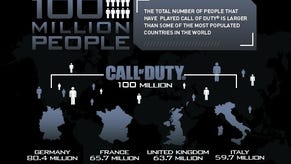Call of Duty: World at War Triple-Format Face-Off
Don't mention the PC version.
Once again, PC meets Xbox 360 meets PlayStation 3 in the latest of our special Bonus Round comparisons, reserved for the most important games of the moment - in this case, Call of Duty: World at War.
Despite its incredible first week of sales, controversy still surrounds the latest release in gaming's most powerful first person shooter franchise. Infinity Ward handing off the Call of Duty baton to Activision development workhouse Treyarch was enough to make many fear the worst. Deeply unimpressive Treyarch PS3 work such as the awful Spider-Man: Web of Shadows suggested that owners of the Sony format should be more than a little cautious of the latest Call of Duty offering.
While Treyarch's output has hardly been impressive of late on PlayStation 3, the fact is that Call of Duty: World at War is easily their best work yet on the Sony platform. There's little in terms of criticism in Dan Whitehead's 8/10 Eurogamer review that doesn't apply equally to both Xbox 360 and PlayStation 3 versions of the game.
Part of the success of World at War on both platforms comes down to the coding DNA that Treyarch inherited from Call of Duty masterminds, Infinity Ward. The game's interface and its overall look and feel is basically identical to the brilliant Call of Duty 4: Modern Warfare. The control scheme is the same, the rules of engagement virtually unchanged. Slap an Infinity Ward logo on the title screen, strip out the wholly unnecessary, teeth-achingly awful dog/knife melee combat and I have the strange feeling that World at War would not have received half the criticism it has from both press and gamers.
The undisputed excellence of Infinity Ward's engine can't be the only reason why World at War works as well it does. Quantum of Solace - another Treyarch effort, also using the COD4 engine - is a disappointing game on both Xbox 360 and PlayStation 3, losing the signature 60 frames-per-second gameplay and proving to be tangibly worse from a technical perspective on the Sony machine. Put simply, all the evidence points to Treyarch pulling out all the stops to make both console versions of World at War as good as possible. The team clearly had their best people on the job, and it shows. And the PC version of game? Um, we'll get to that later.
The Engine
An integral part of the appeal of the Call of Duty games on the current generation of consoles has been Infinity Ward's commitment to 60fps gaming. Put simply, the action feels smoother, more responsive - animation looks more fluid, more real. It's a core dynamic that elevates key aspects of the overall experience over any of its contemporaries. Nobody else - not even first party, console-exclusive software developers - have really made an effort to make their first-person shooters run as smoothly as this.
But the fact is that Call of Duty 4 isn't locked at that magical refresh rate. Instead, it features what you might call a perceptual 60fps - most of the time it runs at this speed, and when it doesn't, the drop is usually slight enough not to be noticed by the human eye - when it is noticeable it'll be on fast horizontal movement and will show up as a judder or stutter. The game can fluctuate at anything between 40fps to 60fps, but the fluctuations are usually so rapid, they're difficult for the human eye to pick up. In measurements of like-for-like footage (see the author's blog), Xbox 360 runs anything from 10 per cent to 20 per cent smoother. The perception, however, is one of parity cross-platform and that, of course, is more important than technical fact.




